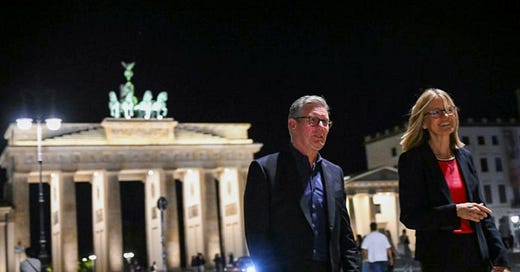Starmer Moves to Rebuild Strong UK-EU Ties
Starmer reiterated that the UK does not intend to reverse Brexit

British Prime Minister Keir Starmer has started efforts to recalibrate the United Kingdom's post-Brexit relations and reshape the country’s economic and defense landscape with the European Union (EU) during recent trips to Germany and France.
Starmer's meetings in Germany and France on August 28 and 29, respectively, reaffirmed the UK’s readiness to revamp ties with the EU for the first time since the Brexit of 2016. That year, the British public voted to leave the European bloc, with many arguing that it no longer suited the country’s economic and political interests.
“We have a once-in-a-generation opportunity to reset our relationship with Europe and strive for genuine, ambitious partnerships that deliver for the British people,” Starmer said ahead of his trip. “We must turn a corner on Brexit and fix the broken relationships left behind by the previous government.”
Starmer’s diplomatic push also represents a new British effort to improve cooperation in defense technology, shared military resources, trade, and other critical areas. The three countries, as well as the 27-member bloc, are preparing for possible changes to US foreign policy, particularly concerning NATO funding if Donald Trump wins the presidential elections in November.
They worry that Trump might use the NATO membership as a bargaining chip, potentially threatening to withdraw unless Europe offers favorable trade terms or political support.
Same Page
During their meeting in Berlin, Starmer and German Chancellor Olaf Scholz agreed to work on a new defense partnership, a significant development given the ongoing Ukraine war and the potential for withdrawing US military support under a Trump administration.
Nils Schmid, the foreign affairs spokesman in parliament for Germany’s ruling SPD party, said Scholz and Keir were center-left allies who were “more or less on the same page” about improving the UK’s relationship with Europe.
“Given the common challenges our two countries face, we are convinced that the time has come to take our bilateral relations to the next level,” the countries said in a joint declaration on deepening and enhancing UK-Germany relations.
In France, Starmer and President Emmanuel Macron discussed mutual interests in defense and tackling irregular immigration after weeks of political unrest in the UK in early August. The riots were sparked by the murder of three white girls.
The latest political efforts are reminiscent of the 2010 Lancaster House agreements when NATO allies France and Britain signed a new treaty aimed at formalizing a new era of military cooperation under the leadership of French President Nicolas Sarkozy and British Prime Minister David Cameron.
Challenges Away and Home
Starmer reiterated that the UK does not intend to reverse Brexit or rejoin the EU, limiting the scope of negotiations. Known for its firm stance on maintaining the integrity of the single market and avoiding "cherry-picking" by third countries, Brussels is unlikely to offer concessions without commitments in return.
"The reset so far is on atmosphere rather than substance,” Chairman of the House of Lords European Affairs Committee, Lord Peter Ricketts, said. “It’s focused on goodwill and good intentions, a commitment to working together, and shared interests.”
As the existing EU-UK Trade and Cooperation Agreement (TCA) signed in December 2020 is due for review in 2026, Starmer likely wants to secure a better trade deal. The UK’s economic performance after Brexit regarding real GDP growth has fallen below Germany and France as of last year, the two largest economies in the EU.

However, this will require careful negotiation. “Starmer cannot just go to Brussels with asks of their own,” said Lord Peter.
Economic Pressures
The UK government is grappling with economic pressures, including a £22 billion fiscal shortfall and poor decisions underscoring the need for a successful diplomatic strategy that could bolster his political standing ahead of the crucial October budget.
As the deadline approaches, British officials are trying to prevent a repeat of the mini-budget chaos experienced in September 2022, when then-Chancellor Kwasi Kwarteng, under the leadership of Liz Truss, announced a $45 billion unfunded tax cut.
The UK’s British Pound crashed to a 37-year low vs. the US Dollar at 1.09 following the announcement.
Investment Opportunities
Starmer's focus on improving trade ties with Germany and France in a new treaty could advantageously position UK sectors such as technology, energy, and defense, supporting contractors in European and global markets.
The defense industry stands to benefit significantly from renewed UK-European partnerships with companies such as BAE Systems and Rolls-Royce, which may see increased demand as defense ties strengthen.
However, recent reports indicated that Germany does not plan to provide additional military support to Ukraine while President Volodymyr Zelensky is gearing up for peace talks at the United Nations General Assembly in New York in September, suggesting the treaty represents less risky investment opportunities in the energy sector.
Firms like EDF, heavily involved in nuclear technology, and Siemens Energy, focusing on renewable resources, could experience growth as bilateral cooperation intensifies, aligning with the EU's Green Deal and the UK's energy security goals.
EDF is actively working on the construction of the Hinkley Point C nuclear power station in the UK to ensure the supply of low-carbon power, while Siemens’ focus on renewable resources aligns with the EU’s broader goals of increasing consumption and reducing emissions, as outlined in the REPowerEU plan, suggesting increased opportunities for contracts and collaborations aimed at scaling up nuclear and energy.




